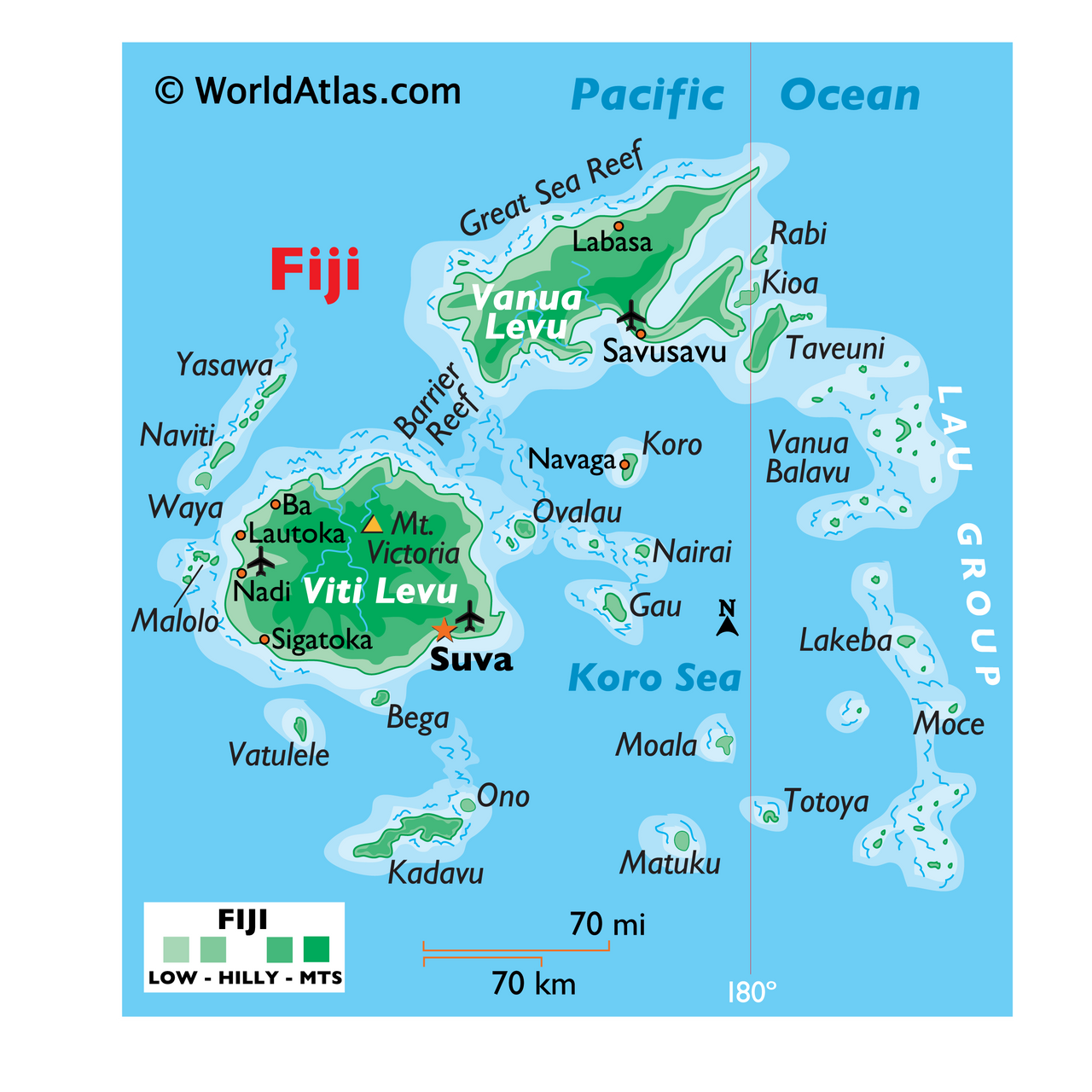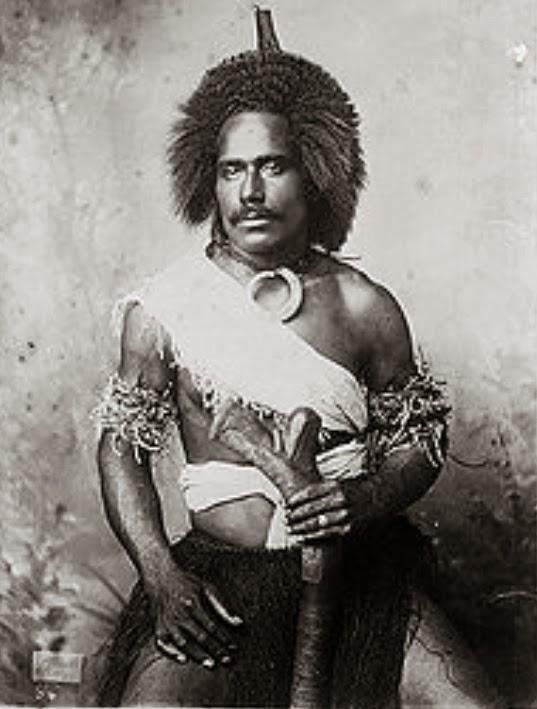Bula! You’re going to hear this friendly greeting a lot. You probably can’t find a friendlier place to visit than Fiji.

Photo: iPhone - Susan Anderson
Fiji’s a nation of islands out in the middle of the South Pacific. While there are more than 300 islands in Fiji, only about a third are inhabited. Some of those are now private resorts, so small you could walk their perimeter in minutes.

Photo: WorldAtlas.com
The nation was first settled by people of African descent. Many of the islands are well-suited for growing sugar cane. When the British colonized Fiji, they brought in Indian laborers to work the sugar cane production. Eventually, the Indian population nearly equaled the indigenous Fijians. They didn’t always get along well, and while there is still some tension between the two major groups, they seem to coexist peacefully now.
Fiji gained its independence from British rule in 1970, and is now self-governing. The British influence shows up in many ways today:
• Fijians learn English from an early age, even though they also speak their own language.
• They drive on the left side of the road.
• Tea is the beverage of choice among locals.
• The government structure includes a house of representatives and a prime minister.

Photo: iPhone - Nice guy in coffee shop. Susan and Eric with the Karururs, our hosts
A Quick Stroll through Fijian History
Like many other islands, Fiji was 'discovered' by European (British and Dutch) explorers. Prior to its discovery the set of islands didn’t “exist” to the western world. However, native Fijians know that an abundant of rich culture and history existed long before it was explored by the Europeans. Many archeologists and anthropologists believe that the original inhabitants of Fiji were the Lapita people. The Lapita people inhabited Fiji around 3000 BC, but around 500 BC their people seemed to vanish. These people are common ancestors for some of the islands that are located in the Southern Pacific Ocean. Modern archeologists and anthropologists discovered distinctive Lapita pottery hidden beneath the earth in Fiji. The Melanesian and Polynesian people also came to Fiji before 500 BC and settled into the islands. The true native Lapita people seem to have disappeared from world, but it is believed that some of the descendants stayed on the island, assimilating with the Melanesian and Polynesian people. That’s what the scholars say.

Photo: iPhone - Susan Anderson
However, Fijian legend tells the origin of their people a different way from the archeologists and anthropologists that study the islands. It is said that the great chief of Lutunasobasoba discovered Fiji. Lutunasobasoba sailed across the ocean from an ancient Western Asian country and landed on Viti Levu (one of the main islands of Fiji) with his crew and family. The family and crew established the first village, called Lomolomo Navadu. His family and crew soon dispersed and created new villages and some even assimilated with new people who came into the land. The story of Lutunasobasoba is one of the more accepted Fiji origin stories told by the Fijian locals, but there are many other stories that exist as well.

Photo taken by Eric LeClair, in the Suva Airport
Even though not everyone can agree that the Lapita people were the first inhabitants of Fiji or that Lutunasobasoba brought his family to Fiji, the next part of history is what everyone seems to agree on.
The people of Fiji were relatively peaceful until 500 BC. Tensions started to grow because the population started to increase rapidly and villages started to fight against one another. Before Europeans and Christian missionaries came to Fiji, cannibalism was common throughout the islands. When villages or tribes went to war against one another, the losing village would often be eaten by the winning village. Literally.
Cannibalism was not practiced by everyone in Fiji.
Usually the chief of the village, the gentry (the nobles), and the men who fought in battle practiced cannibalism. Women and children were considered second-class citizens and were excluded from the practice of eating the vanquished. However, they were welcome to eat any leftovers!

Photo: TripFreakz.com
One 19th century Fijian chief, Ratu Udre Udre claimed to have eaten 872-999 bodies and kept a stack of stones outside his home, with each stone representing one person he had eaten. He believed that once he consumed 1000 bodies he would become immortal. These symbolic stones are placed next to his grave in Fiji in Northern Viti Levu. As of 2003, he even won the Guinness World Record for “most prolific cannibal” – a designation not likely to be bested.
In the 1949 book Naturalist's South Pacific Expedition in Fiji by Otto Degener, the author states that people who died of natural causes were not eaten; only people who were killed were eaten. Cannibalism was utilized in many different ways: as a tool of protection from others, a method of revenge, a solution to famine and hunger, and for religious purposes.
When cannibalism was used for revenge, many people would die. This revenge method would often lead to wars and fights between tribes. It caused the most bloodshed out of all the uses of cannibalism. Tribes would place the bones of their enemies in between the trees surrounding the village or tribe as a warning to outside people to not enter the village and to ward off evil spirits. At some point Fiji was known as the Cannibal Isles throughout the early world. Cannibalism in Fiji soon vanished after the spread of Christianity.

Photo: iPhone - Susan Anderson
The first European discovery of Fiji was made by the Dutch explorer Abel Tasman in 1643. He documented the treacherous and dangerous reefs surrounding the islands and scared off any other explorers for 130 years. English explorer, James Cook, also found Fiji in 1774. He is credited with coining the word Fiji. He asked a villager the name of the island he’d reached, and heard “feegee” (the villager had said, “Viti”) – and so now a whole country name was created because of a mishearing of a pronunciation!

Photo by Eric LeClair
In 1830 the first Christian missionaries came into Fiji. The first notable conversion was of Ratu Ravisa – a chief of the Viwa tribe. His conversion started the onslaught of widespread conversions among the Fijian people and also the new era of a non-cannibalistic Fiji.

Photo: iPhone - Susan Anderson - "Guarding the presidential compound... was tempting to go tickle him or something to see if he'd react. Wisdom prevailed, and a pic sufficed."
For a short period of time there was a constitutional monarchy in Fiji, but soon disbanded after just three years. In 1874 Fiji became a British colony. The British Empire and the colonial government wanted to maintain a good relationship with the Fijian people. The British did not allow Fijians to work in the plantation fields, and instead hired indentured laborers. These laborers came from India and continued to be shipped to Fiji for the next 37 years. After the indentured system was abolished, many of the Indians chose to stay in Fiji to run their own businesses. Now about 40% of Fiji’s population is of Indian descent. In 1970 Fiji declared its independence from Britain, and in 1972 Fiji had its first election.

Photo taken by Eric LeClair - Fijian Prime Minister Offers Safety Advice
Fiji is now home to Fijians, Indians, Europeans, and other Pacific Islanders. They live in harmony with one another and are able to keep their own respective cultures and identities. Fiji’s primary industries are its sugar crop and tourism. Still considered a second world country, Fiji has one of most developed economies in the Pacific largely due to its abundance of minerals, fish, and forestry.

Photo: iPhone - Susan Anderson
If you like this post, click here for my blog page and hit the button in the upper right to follow me!

Written with StackEdit.
Very interesting read on Fiji. It is also one of the places I want to visit.
It's far more amazing than I can even put words to... although I'm sure going to try! Here's the first post of this series, if you're interested. I've been writing a book about my adventures there, and will keep posting parts here. https://steemit.com/travel/@steemitpatina/travel-to-fiji-the-kind-of-vacation-you-carry-home-part-1
I liked that post as well. I've added you to my follow list. Look forward to your future posts.
Thanks! I'll keep going, then! <3
Really nice post; thanks, very interesting to find out about Fiji's history. Also I like the fact that you put the word discovered in quotations. We use that word without even thinking, however it is pretty insulting to the people who actually discovered it, as if history only starts when Westerners stumble upon an existing culture.
Cg
Thanks! It's a fascinating place - both in their history and in how daily life plays out, especially on the smaller islands. Yeah, the whole "discovered" thing drives me nuts, too - as if those who've lived there for thousands of years... somehow didn't. That's part of why I'm planning to post more about the smaller islands - and not the resorts. On the resorts, there's this feeling like you could be in FLORIDA or any other beach area. Our hosts were incredibly gracious to bring us to their family/tribe's island for a week or so... that's what was most memorable.
I want to go to Fiji! Will you take me? Haha
Absolutely! LONG flight, but worth every minute. If you come with us next time, there WILL be Kava-drinking... you jiggy? (Here's a post on it from @mindover https://steemit.com/life/@mindover/an-incredible-3000-year-old-alternative-to-alcohol - I'll probably do one about our experience, too)
Wow. I love the way you write. Makes me want to hop on a plane now. I loved reading about the history of Fiji.
Thank you - that's really kind of you. I'd go again in a heartbeat (well, duh... I guess anyone would!).
Another nice article! upvoted again :)
Hi @steemitpatina
I love Fiji and your piece inspired me to return. A big mistake many tourists make when travelling to this tiny, yet beautiful South Pacific Island is they go to a resort and never move from it. Other than the music and the locals working on the resort, true Fijian life can be missed.
Stay well
@booky :)
100% agreement on that! I almost felt sick the day I went to the touristy area near where we stayed (for a massage... ahhh) - and realized, it was practically FLORIDA. (Nothing wrong with Florida, but if I'm flying halfway around the world and visiting such an interesting place, well, you know.)
Nice article and interesting history! I always wanted to visit fiji island- it is absolutely beautiful over there. I hope i can make it anytime soon!
I hope you go, too! You'll love it. Can't imagine there are beaches anywhere that are more beautiful - and the people are very friendly.